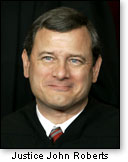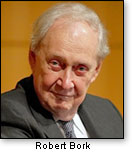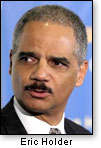
Wes Vernon
Ask Kagan about the Arizona law (she should read it first)
By Wes Vernon
President Obama's Supreme Court nominee, Elena Kagan, should share with us her view of Arizona's controversial immigration law. No excuses. The law's validity will be under her purview either as the current Solicitor General or as a future Justice.
 Last year, this column warned (see 2/5/09) that Elena Kagan (then the nominee for her current position as Solicitor General) had a record that betrays a sixties-style animus toward the military that we depend on to protect America.
Last year, this column warned (see 2/5/09) that Elena Kagan (then the nominee for her current position as Solicitor General) had a record that betrays a sixties-style animus toward the military that we depend on to protect America.
It wasn't just because of her actions as Dean of Harvard Law School to ban military recruiters from the campus (motivated — she said — by problems with laws barring openly avowed homosexuals from the military). It was also her signature on an amicus brief before the Supreme Court urging the justices to strike down the Solomon Amendment. That measure gave universities a choice: either allow military recruiters the same access to students as that accorded other recruiters, or forego certain federal funds. All sitting justices (including the liberals) rejected the Kagan argument.
And don't let anyone tell you she was "only following the law." That measure was then awaiting a final decision from the High Court.
Elaine Donnelly — founder and president of the Center for Military Readiness — says it is unfortunate "that President Barack Obama has chosen to replace the only military veteran on the Supreme Court with extensive wartime experience [90-year-old John Paul Stevens] with a nominee whose only significant record indicates hostility and opposition to laws protecting the culture and best interests of the American military."
Kick upstairs?
We also warned last year that the Solicitor Generalship was widely viewed as a stepping-stone toward a lifetime Supreme Court nomination. That concern has come closer to fruition, and new information on Ms. Kagan is even more troubling. She is an enemy of free speech, however convoluted and code-worded her efforts to justify it.
 First Amendment problems #1
First Amendment problems #1
The First Amendment Center has cited Solicitor General Kagan as arguing, "Whether a given category of speech enjoys First Amendment protection depends upon a categorical balancing of the value of the speech against its societal costs." Among the examples she has cited as inflicting "societal costs" is the familiar Europeanized campus liberal chestnut "hate speech."
That should raise a red flag. The Tea Party groups have been accused of "hate speech" because they demand accountability from those in power. Seditious? "Societal costs?" Not to worry, says this would-be lifetime High Court appointee. It's just a question of whether free speech's harm "outweighs its benefits." Oh? And who decides that? The very court to which you are seeking to be confirmed?
My copy of the Constitution does not say Congress shall make no law "abridging the right of free speech, except in those cases where Political-Correctese is violated."
First Amendment problems #2
Under Kagan's direction, the Obama administration led the (thankfully unsuccessful) effort that would have prohibited corporations and unions from issuing pamphlets, posters, or internet postings advocating or opposing a specific candidate during the height of the campaign season.
 As Chief Justice John Roberts wrote at the time, Kagan's position would sanction censorship not only of radio and television, but "would empower the government to prohibit newspapers from running editorials of opinion pieces supporting or opposing candidates for office," thus "subverting the vibrant public discourse that is at the foundation of our democracy."
As Chief Justice John Roberts wrote at the time, Kagan's position would sanction censorship not only of radio and television, but "would empower the government to prohibit newspapers from running editorials of opinion pieces supporting or opposing candidates for office," thus "subverting the vibrant public discourse that is at the foundation of our democracy."
Kagan and her ilk were rejected by the court on a 5-4 vote. It is alarming that four justices would sanction that Hitlerian/Stalinist power grab. It is small comfort that Kagan — if confirmed — would replace one of the four enemies of free speech and not one of the five who upheld your and my right to speak our minds. The best we can do for now is to knock that down to 3. To do that, Ms. Kagan doesn't make the cut.
First Amendment problems #3
The woman who desires to be our 112th Supreme Court Justice also speaks — rather ominously — of a "redistribution of speech," a phrase that rings somewhere between Orwellian fantasy and Soviet dictat.
It sounds like an endorsement of efforts to shut up conservative talk radio and Fox News and also like an endorsement of FCC Julius "Caesar" Genachowski's plan for government control of the Internet.
The Internet is itself is an inclusive distribution of speech. As establishmentarians disdainfully say, "Some guy in his pajamas sitting in his basement" can tell the world what he thinks. Had it not been for the Internet, the world may not have learned that the 2004 establishment media story about George W. Bush's supposedly shirking his National Guard duty was a media smear — a fraud. And John Kerry might very well have become president. That may have been OK with Ms. Kagan, but is hardly a recommendation for green-lighting her to a seat on the court that has the last word on virtually any earthly legal matter in these United States. (P.S. And I'm "some guy" in my street clothes on the second floor.)
Only getting warmed up
We will have much more to say as this confirmation fight plays out in the coming months. Military hostility and freedom of speech are only two of several issues with this nominee. For now, on to another issue:
Her own words
 After the Senate's petty and disgraceful 1987 rejection of Robert Bork — one of the most eminently qualified Supreme Court nominees in fifty years — Ms. Kagan penned an article in which she opined that senators have allowed nominees to dodge meaningful questions on matters of judicial philosophy.
After the Senate's petty and disgraceful 1987 rejection of Robert Bork — one of the most eminently qualified Supreme Court nominees in fifty years — Ms. Kagan penned an article in which she opined that senators have allowed nominees to dodge meaningful questions on matters of judicial philosophy.
Nominees, she lamented, "get away with vague answers" in a process that had become "a vapid and hollow charade." The nominee should be required to state how he/she would rule, or explain the "votes" he/she would cast, she wrote.
Madame Kagan has since then equivocated on that — perhaps sensing that it could someday come back to haunt her. Let us nonetheless explore her original thesis.
Arizona and immigration
Attorney General Eric Holder (Kagan's boss) says he fears the new Arizona statute dealing with illegal aliens would lend itself to "abuse." After threatening to challenge the law in court, Holder admitted that he had not even read it. The person who would map legal strategy on the issue if it reaches the Supreme Court would be — Voila! The Solicitor General.
 Surely Solicitor General Elena Kagan would have time to read the 10-page law (not counting the 6 pages of footnotes) by the time she testifies at her Supreme Court confirmation hearing.
Surely Solicitor General Elena Kagan would have time to read the 10-page law (not counting the 6 pages of footnotes) by the time she testifies at her Supreme Court confirmation hearing.
If her boss finally finds the time to read the law he has roundly criticized, Ms. Kagan might borrow his copy, read it, and prepare to answer senators' questions about it. What a golden opportunity to avoid "getting away with vague answers" in a "vapid and hollow charade." After all, the state of Arizona is merely attempting to enforce federal laws that Obama, Holder, and Kagan are sworn to uphold.
The overwhelming majority of Americans support the Arizona statute. They would be all ears to learn their Solicitor General's (and would-be Supreme Court Justice's) view.
We all knew President Obama would nominate a liberal to the court. So what? We also knew President Reagan would nominate a conservative. That didn't prevent the Senate from putting Judge Bork on the hot seat, did it?
© Wes Vernon
May 17, 2010
President Obama's Supreme Court nominee, Elena Kagan, should share with us her view of Arizona's controversial immigration law. No excuses. The law's validity will be under her purview either as the current Solicitor General or as a future Justice.
 Last year, this column warned (see 2/5/09) that Elena Kagan (then the nominee for her current position as Solicitor General) had a record that betrays a sixties-style animus toward the military that we depend on to protect America.
Last year, this column warned (see 2/5/09) that Elena Kagan (then the nominee for her current position as Solicitor General) had a record that betrays a sixties-style animus toward the military that we depend on to protect America.It wasn't just because of her actions as Dean of Harvard Law School to ban military recruiters from the campus (motivated — she said — by problems with laws barring openly avowed homosexuals from the military). It was also her signature on an amicus brief before the Supreme Court urging the justices to strike down the Solomon Amendment. That measure gave universities a choice: either allow military recruiters the same access to students as that accorded other recruiters, or forego certain federal funds. All sitting justices (including the liberals) rejected the Kagan argument.
And don't let anyone tell you she was "only following the law." That measure was then awaiting a final decision from the High Court.
Elaine Donnelly — founder and president of the Center for Military Readiness — says it is unfortunate "that President Barack Obama has chosen to replace the only military veteran on the Supreme Court with extensive wartime experience [90-year-old John Paul Stevens] with a nominee whose only significant record indicates hostility and opposition to laws protecting the culture and best interests of the American military."
Kick upstairs?
We also warned last year that the Solicitor Generalship was widely viewed as a stepping-stone toward a lifetime Supreme Court nomination. That concern has come closer to fruition, and new information on Ms. Kagan is even more troubling. She is an enemy of free speech, however convoluted and code-worded her efforts to justify it.
 First Amendment problems #1
First Amendment problems #1The First Amendment Center has cited Solicitor General Kagan as arguing, "Whether a given category of speech enjoys First Amendment protection depends upon a categorical balancing of the value of the speech against its societal costs." Among the examples she has cited as inflicting "societal costs" is the familiar Europeanized campus liberal chestnut "hate speech."
That should raise a red flag. The Tea Party groups have been accused of "hate speech" because they demand accountability from those in power. Seditious? "Societal costs?" Not to worry, says this would-be lifetime High Court appointee. It's just a question of whether free speech's harm "outweighs its benefits." Oh? And who decides that? The very court to which you are seeking to be confirmed?
My copy of the Constitution does not say Congress shall make no law "abridging the right of free speech, except in those cases where Political-Correctese is violated."
First Amendment problems #2
Under Kagan's direction, the Obama administration led the (thankfully unsuccessful) effort that would have prohibited corporations and unions from issuing pamphlets, posters, or internet postings advocating or opposing a specific candidate during the height of the campaign season.
 As Chief Justice John Roberts wrote at the time, Kagan's position would sanction censorship not only of radio and television, but "would empower the government to prohibit newspapers from running editorials of opinion pieces supporting or opposing candidates for office," thus "subverting the vibrant public discourse that is at the foundation of our democracy."
As Chief Justice John Roberts wrote at the time, Kagan's position would sanction censorship not only of radio and television, but "would empower the government to prohibit newspapers from running editorials of opinion pieces supporting or opposing candidates for office," thus "subverting the vibrant public discourse that is at the foundation of our democracy."Kagan and her ilk were rejected by the court on a 5-4 vote. It is alarming that four justices would sanction that Hitlerian/Stalinist power grab. It is small comfort that Kagan — if confirmed — would replace one of the four enemies of free speech and not one of the five who upheld your and my right to speak our minds. The best we can do for now is to knock that down to 3. To do that, Ms. Kagan doesn't make the cut.
First Amendment problems #3
The woman who desires to be our 112th Supreme Court Justice also speaks — rather ominously — of a "redistribution of speech," a phrase that rings somewhere between Orwellian fantasy and Soviet dictat.
It sounds like an endorsement of efforts to shut up conservative talk radio and Fox News and also like an endorsement of FCC Julius "Caesar" Genachowski's plan for government control of the Internet.
The Internet is itself is an inclusive distribution of speech. As establishmentarians disdainfully say, "Some guy in his pajamas sitting in his basement" can tell the world what he thinks. Had it not been for the Internet, the world may not have learned that the 2004 establishment media story about George W. Bush's supposedly shirking his National Guard duty was a media smear — a fraud. And John Kerry might very well have become president. That may have been OK with Ms. Kagan, but is hardly a recommendation for green-lighting her to a seat on the court that has the last word on virtually any earthly legal matter in these United States. (P.S. And I'm "some guy" in my street clothes on the second floor.)
Only getting warmed up
We will have much more to say as this confirmation fight plays out in the coming months. Military hostility and freedom of speech are only two of several issues with this nominee. For now, on to another issue:
Her own words
 After the Senate's petty and disgraceful 1987 rejection of Robert Bork — one of the most eminently qualified Supreme Court nominees in fifty years — Ms. Kagan penned an article in which she opined that senators have allowed nominees to dodge meaningful questions on matters of judicial philosophy.
After the Senate's petty and disgraceful 1987 rejection of Robert Bork — one of the most eminently qualified Supreme Court nominees in fifty years — Ms. Kagan penned an article in which she opined that senators have allowed nominees to dodge meaningful questions on matters of judicial philosophy.Nominees, she lamented, "get away with vague answers" in a process that had become "a vapid and hollow charade." The nominee should be required to state how he/she would rule, or explain the "votes" he/she would cast, she wrote.
Madame Kagan has since then equivocated on that — perhaps sensing that it could someday come back to haunt her. Let us nonetheless explore her original thesis.
Arizona and immigration
Attorney General Eric Holder (Kagan's boss) says he fears the new Arizona statute dealing with illegal aliens would lend itself to "abuse." After threatening to challenge the law in court, Holder admitted that he had not even read it. The person who would map legal strategy on the issue if it reaches the Supreme Court would be — Voila! The Solicitor General.
 Surely Solicitor General Elena Kagan would have time to read the 10-page law (not counting the 6 pages of footnotes) by the time she testifies at her Supreme Court confirmation hearing.
Surely Solicitor General Elena Kagan would have time to read the 10-page law (not counting the 6 pages of footnotes) by the time she testifies at her Supreme Court confirmation hearing.If her boss finally finds the time to read the law he has roundly criticized, Ms. Kagan might borrow his copy, read it, and prepare to answer senators' questions about it. What a golden opportunity to avoid "getting away with vague answers" in a "vapid and hollow charade." After all, the state of Arizona is merely attempting to enforce federal laws that Obama, Holder, and Kagan are sworn to uphold.
The overwhelming majority of Americans support the Arizona statute. They would be all ears to learn their Solicitor General's (and would-be Supreme Court Justice's) view.
We all knew President Obama would nominate a liberal to the court. So what? We also knew President Reagan would nominate a conservative. That didn't prevent the Senate from putting Judge Bork on the hot seat, did it?
© Wes Vernon
The views expressed by RenewAmerica columnists are their own and do not necessarily reflect the position of RenewAmerica or its affiliates.
(See RenewAmerica's publishing standards.)


















